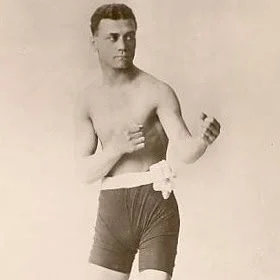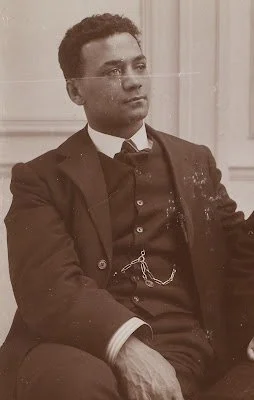Andrew Jephtha: The First Black British Boxing Champion
Andrew Jephtha c1910. Source
Andrew Jephtha (pronounced Jaaftar), born in Cape Town around 1877, was a trailblazer in British boxing history. Not only was he the first black boxer to win a British championship, but his journey from South Africa to the boxing ring in England is a remarkable story of determination, adversity, and unexpected hardship.
Jephtha’s boxing career began at a young age, with the talented young man realising his potential for the sport by the time he was 15. By 1902, he had made his way to England, where he started making a name for himself in the boxing world.
In a twist of fate, Jephtha met Abby Mitchell at the Cardwell Arms in Adlington, Lancashire, where her father owned the pub. The pair quickly fell in love and eloped, marrying in Marylebone in early 1904. Over the next decade, they had four children. Judging off the birthplaces of their children, it’s likely Abby travelled around the country with her husband as his boxing career progressed.
Andrew Jephtha's boxing career reached its peak in 1907 when he faced the British welterweight champion, Curley Watson. In an electrifying match, Jephtha defeated Watson in just four rounds, making history as the first black fighter to win a British boxing title, just a few years before the “born of two white parents” rule was introduced to boxing.
Andrew Jephtha c1907 - Source
However, despite this triumph, Jephtha’s health was already deteriorating. His eyesight was failing, but with a family to support, he continued to fight when he could. He also took part in a Vaudeville play, Black and White, which led to further blows to his head, worsening his condition.
In an attempt to restore his eyesight, Jephtha returned to South Africa in 1912, staying there for 18 months. Hoping that the familiar air of his homeland would improve his vision, he told the Cape Times that he was "very anxious to get back to England to his wife and children."
Despite his efforts, Jephtha’s health continued to decline, and by the time he was back in England, his situation had become dire. Described by the press as "penniless" and a "pitiful case," Jephtha wrote the story of his boxing career, hoping to make a small income from its sale. He was often seen sitting on the pavement by flower sellers in Adderley Street, Cape Town, selling copies of his memoirs.
The boxing community rallied around him, holding fundraisers and collections to support his eye operations, which offered a glimmer of hope for the restoration of his sight. The funds also helped him open a sweet and tobacconist shop in Walthamstow, London, though he was unable to expand his business plans when he eventually lost his sight completely.
Though many sources suggest that Jephtha returned to Cape Town and died there in 1920, evidence suggests otherwise. In January 1922, an article in the Daily Herald mentioned that Jephtha had been granted £2 a month for six months from the Boxers’ Benevolent Fund. In June 1923, the Liverpool Echo reported that he was an inmate at the Royal Infirmary in Liverpool, where he had undergone an eye operation. The article even mentioned his ward number, encouraging friends to visit him.
Jephtha remained in in the UK throughout the 1920s. An article in the Daily Herald in June 1930 mentioned that he was hoping to make the trip back to South Africa that summer. Jephtha did eventually make his way back to South Africa, where he died of pneumonia on 1st September 1931, at the age of 54. He was buried at Wynberg Cemetery in Cape Town, just a short walk from Adderley Street, where he had once sold his memoirs to passersby.
Though Jephtha's life was marked by incredible highs and heartbreaking lows, his legacy as the first black British boxing champion lives on. His story is one of perseverance, and his determination to fight on despite his deteriorating health is a testament to his strength of character.





